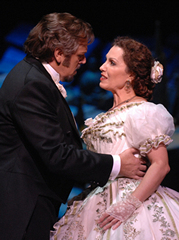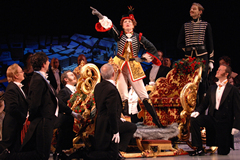Arabella

Strength and warmth ... Peter Coleman-Wright and Cheryl Barker.
Photo: Marco Del Grande
Strauss had already perfected (in Der Rosenkavalier and elsewhere) the brilliantly volatile, energised style in which the music never stands still, like someone working the room at a rather hysterical party.
Richard Hickox and the Opera and Ballet Orchestra propelled this in Act I with a mix of flexibility and forward movement, and it was quickly clear that the whole package of this new production - cast, design (Robert Perdziola) and direction, both musical (Hickox) and theatrical (John Cox) - is a triumph of seduction, coaxing you to enjoy gorgeous sounds and images, even against your better judgment.
Wherefore this restless impulse to keep changing the musical subject? Theodor Adorno suggested Strauss embraced psychological flux because the system of musical keys (what we call tonality) had lost its power to shape musical form, but it is hard not to also see in the distinctive mix of satire and idealism of the librettist Hugo von Hofmannsthal a more psychological explanation, as theatrical archetype, stock-type and fairytale collide.
There is degeneracy and post-Freudian hysteria, represented in the emblematically dysfunctional aristocratic family in which the second daughter, Zdenka, is dressed as a boy to save money, and regeneration in the form of Goethe's redeeming pure woman, das Ewigweibliche, always on hand to mop up the mess men make.
Strauss, the master artificer, does not try to convince us he believes all this. It is an opera about the emotions people think they are supposed to feel when in love: for each facsimile of a noble feeling, Strauss provides a brilliant facsimile of noble music.
Cheryl Barker is superb in the title role, particularly in the third act when her voice had found its pitch focus and strength all wrapped in the warmth of colour. Emma Matthews (Zdenka) is a different vocal type, appealing for its clarity rather than reverberance. Although not a sound traditionally associated with the luxuriance of Strauss, the combination had its own charm in the Act I duet, like matching silk with velvet.
As redeeming women, both have their work cut out. Arabella gets a boorish jealous Croatian, Mandryka, whose redeeming feature is the capacity to look sheepish, and Peter Coleman-Wright had forceful focus, though the role does not emphasise the best parts of his range.
Zdenka gets a self-absorbed army officer who does not even notice when he is inadvertently making love to his beloved's sister: Richard Roberts was passionate in the first act. though after the suggestive Act III overture his voice showed signs of post-coital fatigue.
Conal Coad does a fine character role as Count Waldner, and Milijana Nikolic is strong as Countess Adelaide.
The unsuccessful suitors, Kanen Breen, David Thelander and Barry Ryan, made strong foils for Barker in Act II. Lorina Gore's Fiakermilli was agile but shrill, while Jacqueline Dark's fortune teller conjured apt colours at the opening.
 Arabella, the eponymous heroine of Richard Strauss’s comic opera is looking for love. She is a poor little rich girl seeking a ‘master’ to whom she will be ‘as obedient as a child’ and a firm believer in the notion of ‘Mr. Right’. Her parents alas have other plans for her, namely that she be sold to the highest bidder in order to rescue the families floundering fortunes by means of a profitable marriage. Count Waldner, Arabella’s gambling father who is responsible for their financial demise, sends a picture of Arabella to a decrepit old army friend in the hope of snaring a wealthy husband for his maiden daughter. Fortunately for our heroine the old goat has long gone and the picture ends up in the hands of his wealthy young nephew Mandryka. This ‘prince charming’ character, having been attacked by an over enthusiastic bear and unable to get out of bed for three months, spends the entire time dreaming about the girl in the picture before heading off to Vienna to claim her as his bride.
Arabella, the eponymous heroine of Richard Strauss’s comic opera is looking for love. She is a poor little rich girl seeking a ‘master’ to whom she will be ‘as obedient as a child’ and a firm believer in the notion of ‘Mr. Right’. Her parents alas have other plans for her, namely that she be sold to the highest bidder in order to rescue the families floundering fortunes by means of a profitable marriage. Count Waldner, Arabella’s gambling father who is responsible for their financial demise, sends a picture of Arabella to a decrepit old army friend in the hope of snaring a wealthy husband for his maiden daughter. Fortunately for our heroine the old goat has long gone and the picture ends up in the hands of his wealthy young nephew Mandryka. This ‘prince charming’ character, having been attacked by an over enthusiastic bear and unable to get out of bed for three months, spends the entire time dreaming about the girl in the picture before heading off to Vienna to claim her as his bride. Arabella is the beloved daughter of the Waldners, an aristocratic family of rapidly diminishing means. Their survival depends on a good marriage for their daughter; Arabella has no shortage of suitors but steadfastly awaits "the right man". She finds him in Mandryka. But the Waldners have another daughter, Zdenka, who has been raised as a boy - bringing two daughters out in 19th century Viennese society would be far too expensive. Zdenka unrequitedly loves Arabella's most ardent admirer, Matteo, and forges letters to him from her sister which she passes on in her guise as "Zdenko", Arabella's sister and Matteo's confidant.
Arabella is the beloved daughter of the Waldners, an aristocratic family of rapidly diminishing means. Their survival depends on a good marriage for their daughter; Arabella has no shortage of suitors but steadfastly awaits "the right man". She finds him in Mandryka. But the Waldners have another daughter, Zdenka, who has been raised as a boy - bringing two daughters out in 19th century Viennese society would be far too expensive. Zdenka unrequitedly loves Arabella's most ardent admirer, Matteo, and forges letters to him from her sister which she passes on in her guise as "Zdenko", Arabella's sister and Matteo's confidant.  Singing Mandryka is Barker's real-life partner, baritone Peter Coleman-Wright. Unsurprisingly, the chemistry between the two is potent. When, in the duet "Und du wirst mein Gebieter sein", they pledge themselves to one another, the electricity is palpable. Indeed, it's hard to know whether to watch, amazed, or turn aside and give them their privacy. Coleman-Wright's Mandryka is a genial and appealing creation; what his voice lacks in outright splendour he makes up for in elegant phrasing and smooth, Straussian legato.
Singing Mandryka is Barker's real-life partner, baritone Peter Coleman-Wright. Unsurprisingly, the chemistry between the two is potent. When, in the duet "Und du wirst mein Gebieter sein", they pledge themselves to one another, the electricity is palpable. Indeed, it's hard to know whether to watch, amazed, or turn aside and give them their privacy. Coleman-Wright's Mandryka is a genial and appealing creation; what his voice lacks in outright splendour he makes up for in elegant phrasing and smooth, Straussian legato.